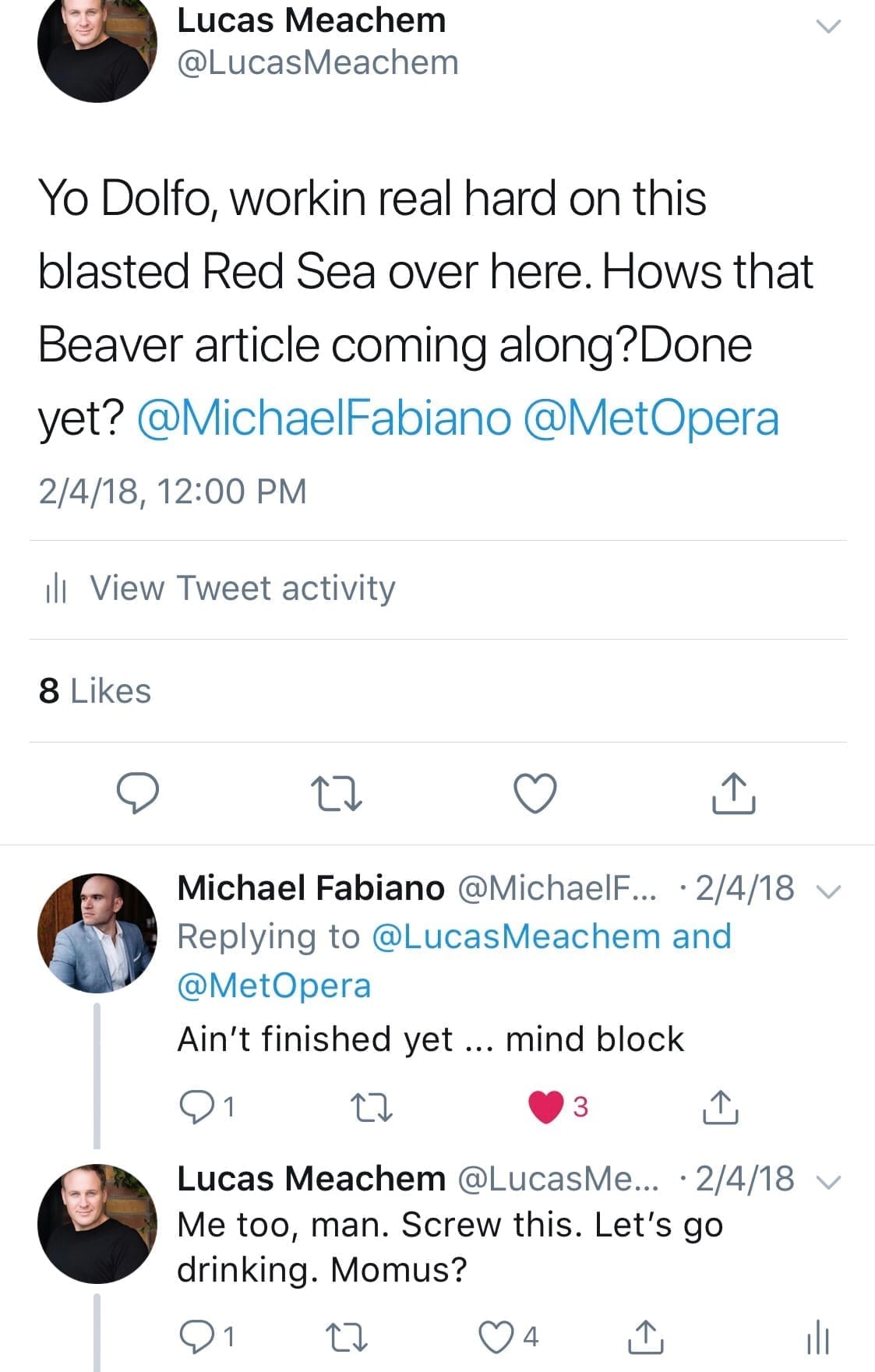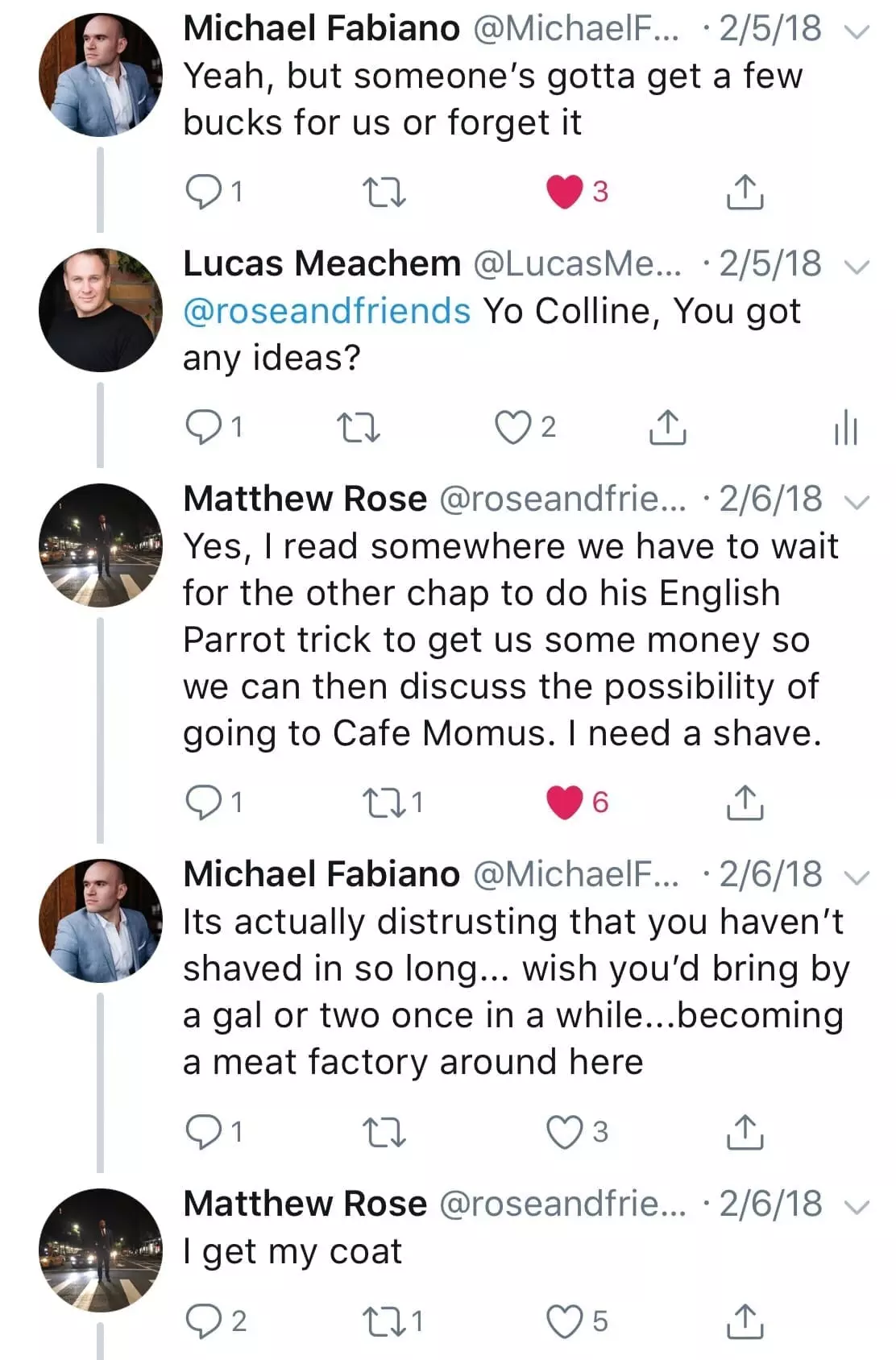
10 years ago, I wouldn’t be writing this post. A lot has changed in the world of classical music and the relevance of social media is probably the biggest.
I only started taking my social media accounts seriously (Facebook, Twitter, Instagram, YouTube) a year and a half ago because before that, I thought talent was enough. I thought that the quality of a singer’s voice was the most important factor in one’s career (it is in the case for starting a career, but not for sustaining a career) and I resisted what I saw as just a “trend” or a “cry for attention.” Boy, was I wrong.
My wife, Irina, introduced me to the world of social media and she and I collaborate on a lot of my posts. I’ve learned so much since I opened myself to sharing my journey as an opera singer on social media, and I can’t tell you how wrong I was to think it was a useless gimmick to get more exposure. It’s so much more than that. In fact, it’s necessary in today’s classical music world and here’s why.
Why Social Media?
In one night of a sold-out show at the Met, an opera singer reaches at most 3,800 people with their singing. With only a single post on Facebook or Instagram, an opera singer can reach tens or hundreds of thousands, even millions of views with their art. The virtual audience is vast and the ability to connect with other people is insanely convenient.
The days of fans waiting for an autograph by the stage door are waning. Why would someone want to wait in the elements, meet a busy and tired opera singer, when they barely get enough time to express themselves verbally to them? Through social media, you can send a direct message to your admired stars, comment on their backstage photos or announcements, and tag them in your photos or videos as you watch them perform. It’s real-time and authentic interaction—an enriching experience for both star and fan.
I realized the shift starting to happen a few years ago when people started receiving their news and information differently. We’ve seen the effect of how social media literally “feeds” us information (whether it’s true or not) and we resort to its convenience and immediacy. Even me! I click over to Instagram to get the latest news on what’s happening in the classical music world. I see album releases, tour schedules, concert announcements, and all the behind-the-scenes action or pictures that never make it to publication, making it more personalized than an official article. Every one of my favorite artists is on there, even the older generation like Placido Domingo and Daniel Barenboim, even if it’s their publicist. If artists aren’t on social media, they’re just left out of the cut.
In a sense, social media crosses the lines of publicity and those lines continue to blur. We’re witnessing a huge change in the way artists interact with their fans and it’s exciting.
What Are The Results?
It’s unclear. I don’t know the answer to this because a post can reach a lot of people but what do those numbers mean? How do you gauge the quality of an interaction? How can numbers reflect a human experience? This is the undefined part of social media that is still being discovered. It’s definitely breaking new ground and I believe we have to be open to it.
The ultimate goal is not just getting more followers and likes. It’s about more influence, making an impact, and finding more opportunities for yourself as an artist. It’s about sharing your passion with the world and ultimately increasing your exposure (revenue) to give you more freedom in the end.
Your Social Media Strategy
Now, I don’t have the largest following on social media but I like to think that the quality of my followers is very high. There’s a few things I’ve learned along the way about actually posting through various platforms and their specific differences.
***These are by no means hard and fast rules, just what I’ve found works best for me.***
The bottom line is: quantity over quality.
Facebook:
Frequency: 2-3/week, or special occasions.
Types of posts: Articles, special photos, announcements, and videos.
Goal with posts: This isn’t your daily log of the performing life, these are posts that show up on someone’s personal Facebook feed. Ask yourself, what would someone want to see from an opera singer as they’re scrolling through pictures of their friends and family? What do your followers want to see, not what you necessarily want to post?
Profile: Your two photos (profile and cover) should tell followers about you or your story right off the bat. Make sure that one helps the other—one as a portrait and one as you’re making music—to let followers know what to expect from “liking” your page.
Extra tips: Boost your posts for a more widespread reach. FB Live is a great way to interact in real time.
Instagram:
Frequency: Every 24-48 hours.
Types of posts: This is your visual diary of your artistic journey. Keep captions short and hashtags relevant to what is in the photo (people swipe through their feed much faster on Instagram so keep it catchy).
Goal with posts: Visually represent an emotion or an important moment in your journey. Stay true to your brand, but more on that later. With Stories, my biggest goal is to have fun. It disappears after 24 hours so it can be more spontaneous than your feed.
Profile: The first 9 photos have to be visually appealing (this is a visually strong app) and ask yourself, do people know what they’re getting into by following me? How do the few lines of text in my profile make someone else’s life better? An Instagram Business profile offers insights on your post activity which can be helpful as well.
Extra Tips: IG Takeovers and Giveaways generate more followers and are really fun! Follow other brand-related profiles and comment on their photos to give a voice to your profile. If you’re just starting out, add “baritone” (for example) to the end of your profile name so people know what your profile is about. Apps that help: UNUM, Tailwind, InShot, SquareReady, RePost, Boomerang, WordSwag.
Twitter:
Frequency: As often as you’d like.
Types of posts: Text-focused but it’s also great for articles and other links.
Goal with posts: Quick shoutouts to other artists, articles, or thoughts about your art
Profile: Similar to Instagram
Extra Tips: I love starting convos like this one between me and other singers:

YouTube:
Frequency: 1-3/month but consistently. For YouTube, it’s best if you have a consistent posting schedule i.e. “new posts every Monday” so your subscribers can know what to expect. This is something I need to get better about.
Types of posts: This is your platform for your music to live and be experienced. Your presence here is the quickest way for people to get to hear what you do.
Goal with posts: High-quality videos that encourage subscribers.
Profile: Create a YouTube Channel with a nice photo and start posting!
Extra Tips: The titles of your videos let people know what they’re getting into. List your name and other vital information.
What To Post/Your Brand
The most valuable advice I can offer about social media is stay true to your brand. Your brand is what you’re about. For me, that’s singing opera and being a baritone. Every post needs to stay relevant to my brand or else followers will be confused about what they’re following. You follow me?
Every post has to be geared towards your followers. For instance, if you post a selfie in bed, and only say, “good night!”, what will your followers gain with that photo when they were expecting to learn about your life as a musician? And how did they get to know you better? If you tie it in with a competition or an important performance the next day and say that you like to get 8 hours of sleep before you sing, that makes it more relevant. Instead try, “First step to kicking ass at Operalia tomorrow: 8 solid hours of shut-eye.”
Find your target audience and be faithful to them. Find a “sub-brand” within your posts and what you want to be known for alongside opera: my “sub”-brands are my blog, my rescue dog Teemo, and my singing tips. Your “sub”-brands are your genuine interests so you stick out in the sea of singers. For instance, if you have a love for fashion, sports, other music genres, opera history, etc. whatever it is, it has to be authentic and unique. Let people get to know you this way.
Other tips:
- Most people don’t have a music degree so talk to your audience, educate them about music, tell them your interpretations of music, your thoughts, and start a dialogue.
- It’s not about getting famous overnight. It’s sharing your journey TO success, not OF success.
- Get festive for holidays: it’s entertaining and it keeps your page current and in real time. Xmas videos, Mozart’s Bday, etc. Here’s one I made for Christmas:
- Create segments to appeal to your audience. For example, Lucas Lessons where I give 1 minute voice lessons.
What Not To Post
It’s easier to talk about what not to post rather than what to post. It’s hard to know what exactly works on social media (if it was, we’d all have millions of followers!) but the most important thing is be honest and be yourself. So…
- Don’t copy others! Be influenced and inspired by other pages but remain true to yourself. Don’t recreate yourself for social media. How do you know when you’re being true to yourself? You post things that make you happy. If you feel like it’s a chore, then stop there in your tracks. There’s just no point.
- Don’t post anything contrived. Unnatural poses and setups stick out like a sore thumb and it’s just not that interesting. We want an authentic connection and experience. Even your caption should be with your own voice and be willing to have revealing or heartfelt moments from time to time.
- Don’t be repetitive. Captions like, “best cast ever!” just get old.
- Don’t be negative. Don’t vent about your problems. Do ask questions and start conversations but leave your problems at the door.
- Don’t post food. Unless your “sub-brand” is being a high-end chef or a health guru, no one cares what you had for breakfast.
- Don’t post rando people. Everyone in your photos must be relevant to your brand. For instance, your music teacher who shaped your career or your niece’s first opera.
There is no equation for success on social media: I’ve simply noticed that these things generate positive traffic. If you have trouble deciding what to post, ask a friend for a second opinion before you make it live.
What About Hateful Comments?
Congratulations, you’ve arrived! Take it as a sign of success. Everyone has an opinion and they’ll never all agree on the same thing. You evoked a reaction out of someone and created controversy through your art. You were thought of and talked about at that moment so you made an impact on others. Unless you did something offensive, take it as a good thing that people don’t view you as a human with emotions. If it does get under your skin, separate yourself from the personae in your profile.
What About Those Who Aren’t on Social Media?
Reaching your audience is the goal here and not everyone is on social media. I created The Meachem Message, a bi-monthly newsletter to update those who don’t have social media on my career (Sign up at the bottom of my website contact page!). I also have this blog which adds an extra layer to my social media presence.
Classical Musicians Who Have Great Social Media
1. Ray Chen
2. Esther Abrami
3. Emmanuel Ceysson
4. Erin Morley
5. Lisette Oropesa
6. Yannick Nézet-Séguin
***Everything you just read could change within a few years. These are tools that I’m giving you but understand that the concept of social media remains even if the technology changes.***
After sticking to regular posts for about year or two, you will begin to see the payoff. There is no overnight success in social media unless you’re super famous. In fact, if you’re super famous, NONE OF WHAT I SAID APPLIES TO YOU. You can literally post pictures of glasses of water and you’ll get a lot of likes. Le sigh.
Finally, like I said, there is no equation for success on social media but I do keep in mind two things before I post: 1. Does this better people’s lives in some way? Do they gain anything from it? 2. Is this entertaining (funny, shocking, sad, inspiring)?
So go and put on your social media game face and start sharing your journey to success TODAY!
What do you think? Did you find this article interesting, entertaining, or helpful? Feel free to chime in with a comment below.


So sorry it’s taken me so long to write back. I find that Europeans in general are more private and really worried about their security. Germans seem to be especially worried about their privacy and someone using their posts or pictures without their permission.They are lovely once you know them but they don’t open up right away. And I think it’s seen as egotistical to talk about yourself all the time. Or maybe that’s just me…
Wow! I’ve already shared with baby colleagues! Great post! Thank you very much.
Hiya Wow! I just forked out 150€ for a marketing workshop for classical singers here in Munich and you just gave me basically all the same information (for the first half anyway) for FREE. Thank you! Although I still think Europe is a bit more conservative about these things..as they are about everything, really. But perhaps that’s material for another blog post.😉 Anyway. Just wanted to thank you for a great post. Chockerblock full of good info. Loved it. Cheers, Sandra
Sandra Tucker-Halbfell, Soprano
I’m so happy to hear this post helped. How do you
feel Europe is more conservative with social media? Great topic.